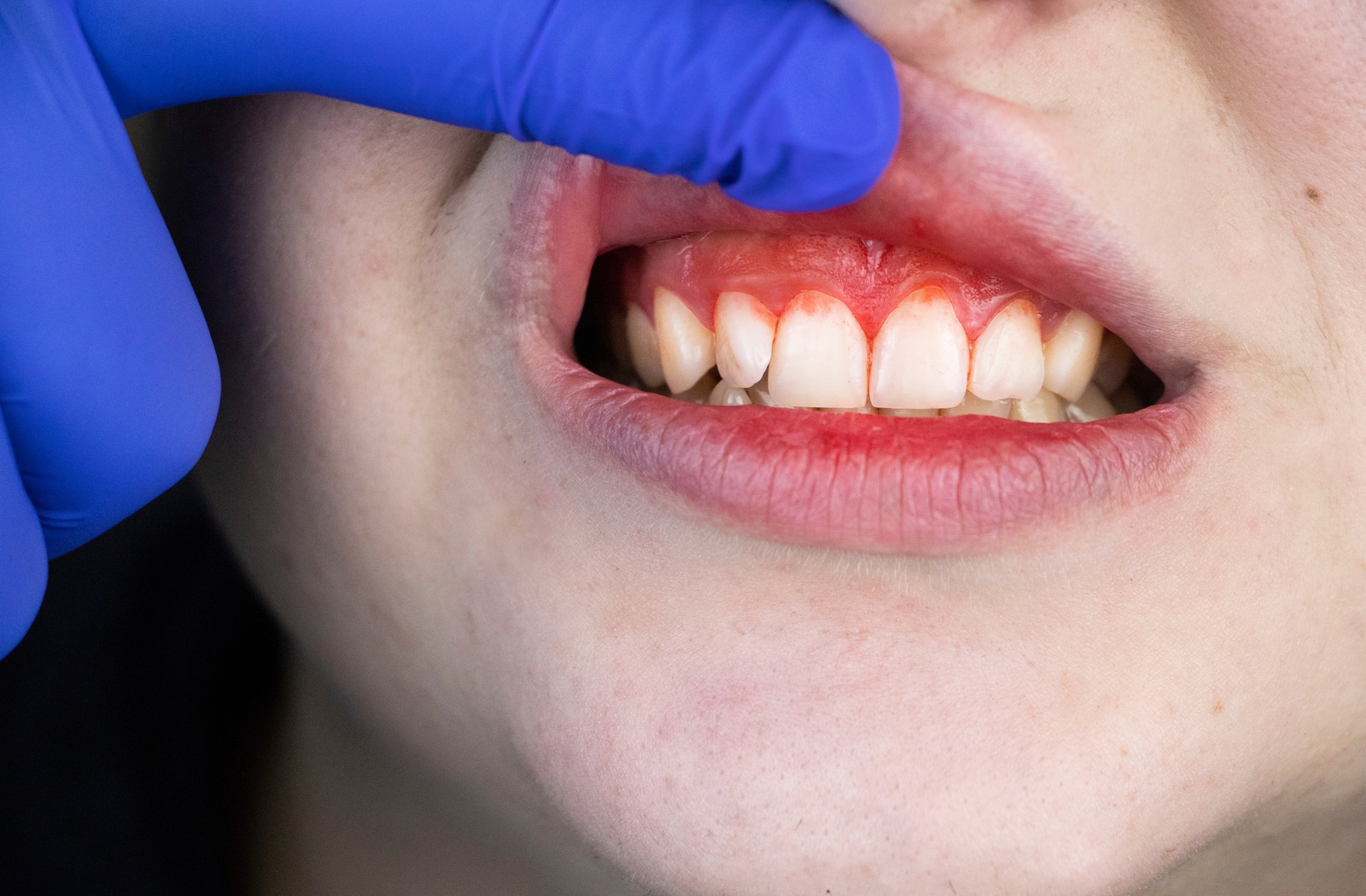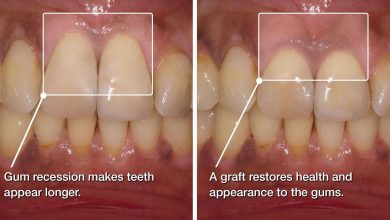How to Stop Gum Bleeding After Dental Cleaning?

To stop gum bleeding after dental cleaning, apply gentle pressure with a clean cloth or gauze on the affected area for 10 to 15 minutes. Gum bleeding is a common occurrence after dental cleaning.
While it may be unsettling, there are simple steps you can take to stop the bleeding. Applying gentle pressure on the affected area with a clean cloth or gauze for about 10 to 15 minutes can promote clotting and halt the bleeding.
This helps to prevent the blood vessels from becoming inflamed and ensures proper healing. In addition to this, maintaining good oral hygiene, avoiding hard or sharp foods, and refraining from smoking can aid in the healing process. By following these steps, you can effectively stop gum bleeding and maintain optimal oral health.
Understanding Gum Bleeding After Dental Cleaning
Understanding Gum Bleeding after Dental Cleaning
Gum bleeding after dental cleaning can be a common occurrence, but it is important to address it promptly to prevent further complications. Several factors can contribute to gum bleeding after a dental cleaning. One of the main culprits is gum inflammation, known as gingivitis, caused by plaque buildup. When plaque accumulates on the teeth and gums, it can lead to irritation and inflammation, resulting in bleeding.
Poor oral hygiene habits, such as inadequate brushing and flossing, can also contribute to gum bleeding after dental cleaning. Additionally, certain medications, hormonal changes during pregnancy, and medical conditions like diabetes can increase the risk of gum bleeding.
To address gum bleeding after dental cleaning, it is crucial to maintain good oral hygiene practices. This includes brushing your teeth twice a day with a soft-bristle toothbrush and fluoride toothpaste, as well as flossing daily. Regular dental check-ups and professional cleanings are also essential to remove any plaque and tartar buildup.
If gum bleeding persists or becomes severe, it is essential to consult with a dentist to determine the underlying cause and receive appropriate treatment. Remember, early detection and intervention can help prevent further gum issues and maintain a healthy smile.
Effective Home Remedies For Stopping Gum Bleeding
Gum bleeding after dental cleaning is a common issue that many people experience. It can be uncomfortable and may indicate an underlying problem. Fortunately, there are several effective home remedies that can help stop gum bleeding and promote oral health.
Rinsing with a saltwater solution is a simple and inexpensive way to reduce inflammation and prevent gum bleeding. Mix half a teaspoon of salt in a glass of warm water and swish it around your mouth for 30 seconds before spitting it out.
Applying a cold compress to the affected area can help reduce swelling and stop gum bleeding. Wrap an ice pack or a bag of frozen peas in a thin cloth and apply it to the outside of your cheek for 10 minutes.
Using herbal mouthwashes that contain ingredients like chamomile, sage, or calendula can help soothe gum inflammation and prevent bleeding. Look for natural mouthwashes at your local health food store or make your own by steeping these herbs in hot water and allowing the solution to cool before using.
Trying natural remedies like aloe vera gel and tea tree oil can also be effective in stopping gum bleeding. Apply a small amount of aloe vera gel or diluted tea tree oil directly to the affected area to promote healing and reduce inflammation.
Professional Treatments To Stop Gum Bleeding
One effective professional treatment to stop gum bleeding is scaling and root planing. This procedure involves deep cleaning of the teeth and gums to remove plaque and tartar buildup that can cause gum disease. It helps eliminate bacteria and toxins, promoting gum tissue healing and reducing inflammation. Additionally, periodontal laser therapy is another option for treating gum bleeding. This treatment utilizes laser technology to remove infected gum tissue and promote gum reattachment. It is a precise and minimally invasive procedure that can effectively control bleeding and stimulate gum tissue regeneration. Lastly, for individuals with loose teeth caused by gum disease, dental splinting can be a suitable treatment. This technique involves bonding the loose teeth to stable neighboring teeth or using dental splints to secure them in place. This helps provide stability and support to the weakened teeth, reducing gum bleeding and improving oral health.
Preventive Measures To Avoid Gum Bleeding
Preventive Measures to Avoid Gum Bleeding:
Maintaining proper oral hygiene practices is essential in preventing gum bleeding. This includes brushing at least twice a day with a soft-bristled toothbrush and using fluoride toothpaste. It is important to gently brush along the gumline to remove plaque and prevent gum inflammation.
Regular dental check-ups and cleanings are crucial to identify and treat early signs of gum disease. Dentists can remove hardened plaque and tartar that cannot be removed through regular brushing and flossing alone. These professional cleanings help reduce the risk of gum bleeding.
Quitting smoking and reducing alcohol consumption can significantly decrease the chances of gum bleeding. Smoking weakens the immune system and restricts blood flow, compromising the health of the gums. Limiting alcohol intake can also prevent gum inflammation and bleeding.
Avoiding high sugar and acidic foods is another preventive measure. Consuming excessive sugar can lead to plaque buildup and increased bacteria in the mouth. Acidic foods erode tooth enamel and irritate the gums, leading to bleeding. It is advisable to choose a balanced diet rich in fruits, vegetables, and whole grains to maintain overall oral health.
When To Seek Medical Attention
Experiencing gum bleeding after dental cleaning can be a common occurrence, but there are certain situations when seeking medical attention becomes necessary. Signs that warrant immediate dental attention include excessive bleeding that continues for more than a day and is accompanied by intense pain or swelling. Additionally, if you notice any abnormal discharge or foul odor coming from the affected gums, it is essential to consult a dentist promptly.
Remember, persistent gum bleeding can be an indication of underlying oral health issues such as gum disease or infections. It is crucial to address these concerns as soon as possible to prevent further complications. Reach out to your dentist if you have any concerns or if the bleeding does not subside after a reasonable period. They can assess the situation, provide appropriate treatment, and offer guidance on maintaining good oral hygiene to prevent future gum bleeding episodes.

Credit: southgatedentalcentre.com
Frequently Asked Questions Of How To Stop Gum Bleeding After Dental Cleaning?
What If My Gums Wont Stop Bleeding After Dental Cleaning?
If your gums continue to bleed after dental cleaning, it’s important to contact your dentist. It could indicate an underlying issue or improper cleaning technique. Promptly seeking professional advice is essential for proper diagnosis and treatment.
How Do You Heal Gums After Cleaning?
To heal gums after cleaning, follow these steps: 1. Rinse your mouth with warm saltwater to reduce inflammation and prevent infection. 2. Apply a cold compress to reduce swelling and pain. 3. Avoid consuming hard, crunchy, or spicy foods that can irritate your gums.
4. Brush gently and use a soft-bristled toothbrush to prevent further damage. 5. Schedule regular dental check-ups for professional guidance and treatment.
Is It Normal To Bleed During A Dental Cleaning?
Bleeding during a dental cleaning is sometimes normal. It can happen due to gum inflammation or sensitivity. It’s important to let your dentist know if it persists or if you experience excessive bleeding. Regular dental cleanings can help prevent gum disease and reduce bleeding during cleanings.
How Do Dentists Stop Bleeding Gums?
Dentists stop bleeding gums by treating the underlying cause, such as plaque buildup or gum disease. They may recommend proper oral hygiene practices, professional cleanings, medications, or even surgery if necessary. Prompt dental care is essential for preventing further complications and maintaining oral health.
Conclusion
To wrap up, taking care of your gums after a dental cleaning is crucial for preventing gum bleeding. By following the steps mentioned in this blog post – maintaining good oral hygiene, using a soft-bristle toothbrush, avoiding certain foods, rinsing with saltwater, and using natural remedies – you can effectively stop gum bleeding.
Remember to consult your dentist if the bleeding persists. Stay committed to your oral health routine and enjoy a healthy, bleeding-free smile!





